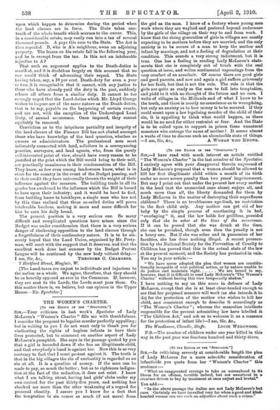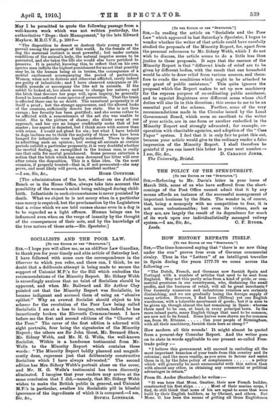LTO TEO EDITOR OP TETI "SPECTATOR.")
Sin,—In criticising severely at considerable length the plea of Lady McLaren for a more scientific consideration of infanticide you quote from her "Women's Charter" this sentence :—
" What an exaggerated revenge to take on womanhood in its bloom for an offence, terrible indeed, but not unnatural in a creature driven to bay by treatment at once unjust and brutal.'
You add:— "In the above passage the italics arc not Lady McLaren's but ours. Certainly we have travelled very far when a good and kind- hearted woman can use such an adjective about such a crime." May I be permitted to quote the following passage from a well-known work which was not written yesterday, the authoritative " Dogs : their Management," by the late Edward Mayhew, M.R.C.V.S., p. 200 ?— " The disposition to desert or destroy their young seems to prevail among the parentage of this world. In the female of the dog the maternal instinct is most powerful ; but under certain conditions of the animal's body, the natural impulse seems to be perverted, and she takes the life she would else have perished to preserve. It is painful, knowing this, to reflect that on his ovra species man inflicts the highest punishment for an act that possibly may be, in the human being as in brutes, the consequence of a mental excitement accompanying the period of parturition. Women, when not in distress and otherwise afflicted, rarely indeed are guilty of infanticide ; and I have observed annoyance or ill- health precede or accompany the like act in animals. If the rabbit be looked at, her alarm seems to change her nature; and the bitch that devours her pups will, upon inquiry, be generally found to have suffered some species of persecution. That the brain is affected there can be no doubt. The unnatural propensity is of itself a proof ; but the strange appearance, and the altered looks - of the creature, sufficiently denote her state. She is not then ravage; her ferocity has been gratified ; and she seems rather to be afflicted with a remembrance of the act she was unable to resist. She is the picture of shame; she slinks away at our • approach, and her eye no longer confidently seeks that of her master ; her aspect is dejected, but I think more with sorrow than with crime. I would not plead for sin; • but what I have beheld in dogs inclines me to think the majority of those who have been hanged for infanticide were legally murdered. There is danger in admitting such an opinion ; but seeing all animals at certain periods exhibit a particular propensity, it is very doubtful whether the morbid feeling, as exemplified in the human race, is really one that calls for mortal punishment. Some persons entertain a notion that the bitch which has once devoured her litter will ever • after retain the disposition. This is a false idea. On the next occasion, if properly treated—that is, if not persecuted—she may prove, and most likely will prove, an excellent mother."
[The administrators of the law, whether on the Judicial - Bench or in the Home Office, always take into account the possibility of the woman's mind being unhinged during child- birth. Infanticide in such circumstances is never punished by death. What we object to is not mercy when in a particular case mercy is required, but the proclamation by the Legislature that a crime which we are told causes shame even in a dog is to be regarded as a light offence. Human beings can be influenced even when on the verge of insanity by the thought of the consequences of their acts, and by the knowledge of the true nature of those acts.—En. Spectator.]











































 Previous page
Previous page